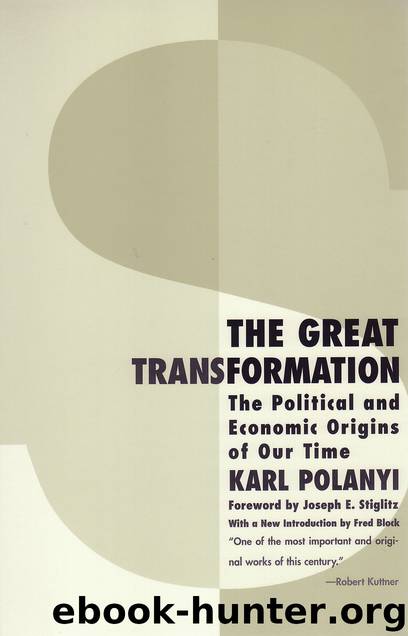The Great Transformation by Karl Polanyi

Author:Karl Polanyi
Language: eng
Format: epub
Publisher: Beacon Press
Published: 2010-06-02T04:00:00+00:00
C H A P T E R T H I R T E E N
Birth of the Liberal Creed (Continued):
Class Interest and Social Change
The liberal myth of the collectivist conspiracy must be completely dissipated before the true basis of nineteenth-century policies can be laid bare. This legend has it that protectionism was merely the result of sinister interests of agrarians, manufacturers, and trade unionists, who blindly wrecked the automatic machinery of the market. In another form, and, of course, with an opposite political tendency, Marxian parties argued in equally sectional terms. (That the essential philosophy of Marx centerd on the totality of society and the noneconomic nature of man is irrelevant here.*) Marx himself followed Ricardo in defining classes in economic terms, and economic exploitation was undoubtedly a feature of the bourgeois age.
In popular Marxism this led to a crude class theory of social development. Pressure for markets and zones of influence was simply ascribed to the profit motive of a handful of financiers. Imperialism was explained as a capitalist conspiracy to induce governments to launch wars in the interests of big business. Wars were held to be caused by these interests in combination with armament firms who miraculously gained the capacity to drive whole nations into fatal policies, contrary to their vital interests. Liberals and Marxists agreed, in effect, in deducing the protectionist movement from the force of sectional interests; in accounting for agrarian tariffs by the political pull of reactionary landlords; in making the profit hunger of industrial magnates accountable for the growth of monopolistic forms of enterprise; in presenting war as the work of business rampant.
The liberal economic outlook thus found powerful support in a narrow class theory. Upholding the viewpoint of opposing classes, liberals and Marxists stood for identical propositions. They established a watertight case for the assertion that nineteenth-century protectionism was the result of class action, and that such action must have primarily served the economic interests of the members of the classes concerned. Between them they all but completely obstructed an overall view of market society, and of the function of protectionism in such a society.
Actually, class interests offer only a limited explanation of longrun movements in society. The fate of classes is more frequently determined by the needs of society than the fate of society is determined by the needs of classes. Given a definite structure of society, the class theory works; but what if that structure itself undergoes a change? A class that has become functionless may disintegrate and be supplanted overnight by a new class or classes. Also, the chances of classes in a struggle will depend upon their ability to win support from outside their own membership, which again will depend upon their fulfillment of tasks set by interests wider than their own. Thus neither the birth nor the death of classes, neither their aims nor the degree to which they attain them; neither their cooperations nor their antagonisms can be understood apart from the interests of society, given by its situation as a whole.
Download
This site does not store any files on its server. We only index and link to content provided by other sites. Please contact the content providers to delete copyright contents if any and email us, we'll remove relevant links or contents immediately.
International Integration of the Brazilian Economy by Elias C. Grivoyannis(111059)
The Radium Girls by Kate Moore(12028)
Turbulence by E. J. Noyes(8050)
Nudge - Improving Decisions about Health, Wealth, and Happiness by Thaler Sunstein(7707)
The Black Swan by Nassim Nicholas Taleb(7129)
Rich Dad Poor Dad by Robert T. Kiyosaki(6633)
Pioneering Portfolio Management by David F. Swensen(6301)
Man-made Catastrophes and Risk Information Concealment by Dmitry Chernov & Didier Sornette(6019)
Zero to One by Peter Thiel(5802)
Secrecy World by Jake Bernstein(4753)
Millionaire: The Philanderer, Gambler, and Duelist Who Invented Modern Finance by Janet Gleeson(4478)
The Age of Surveillance Capitalism by Shoshana Zuboff(4293)
Skin in the Game by Nassim Nicholas Taleb(4249)
The Money Culture by Michael Lewis(4207)
Bullshit Jobs by David Graeber(4190)
Skin in the Game: Hidden Asymmetries in Daily Life by Nassim Nicholas Taleb(4007)
The Dhandho Investor by Mohnish Pabrai(3765)
The Wisdom of Finance by Mihir Desai(3747)
Blockchain Basics by Daniel Drescher(3583)
